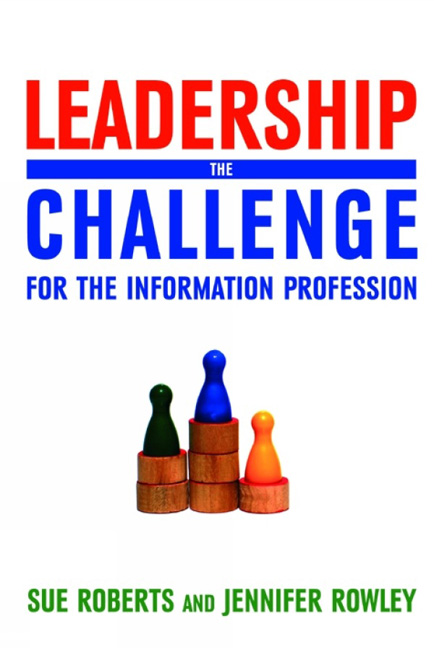1 - Context and challenges in leadership
Published online by Cambridge University Press: 08 June 2018
Summary
Learning objectives
After reading this chapter you should be able to:
☑appreciate the need for leadership within library and information services
☑understand the relationship between management and leadership
☑engage in the debate about the link between leadership and change
☑engage in the debate surrounding the state of leadership within the library and information profession
☑understand the underpinning philosophy of this book and how the different chapters and elements interconnect
☑begin to consider the approaches and challenges to ‘self leadership’ and managing yourself.
Introduction
This chapter provides orientation both to the book and to the concept and challenges of leadership. It will discuss issues such as the importance of leadership for information services of all types, provide an overview of the key theories surrounding the relationship between management and leadership, and explore the link between leadership and the imperative for change within organizations. The chapter then discusses the challenges for leadership within library and information services across the sectors and globally, drawing on theory, literature and practice, with illustrative scenarios. The next section provides an insight into the underpinning philosophy of this book and our approach to considering leadership for 21st-century information services; this signposts themes in future chapters and interlinks topics in a holistic way. Finally, the chapter highlights the critical importance of ‘self-leadership’, which is a recurrent theme. We hope this will initiate or strengthen the self-reflection that is required by all leaders at whatever stage of their career and personal and professional development.
Why leadership?
In Managing Information Services (Roberts and Rowley, 2004) we explored leadership briefly as one aspect of a chapter called ‘Management and leadership’. We rapidly realized that leadership as a concept – the theories, myths and practices surrounding it – was fundamental to the present and future development of library and information services across all sectors and all nations. Handy (1993, 96) asks provocatively and ironically, ‘Surely a group of intelligent, well-meaning individuals can tackle any problem without the need for a leader?’, yet history, research and our own experiences dispute this assumption!
This obsession with leadership pervades all aspects of our lives. Writers on the current state of leadership globally have identified a ‘crisis’ in leadership at the level of politics and society as well as within organizations (Bennis and Nanus, 1997; Taffinder, 1995).
- Type
- Chapter
- Information
- LeadershipThe challenge for the information profession, pp. 1 - 22Publisher: FacetPrint publication year: 2008

